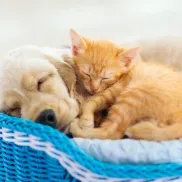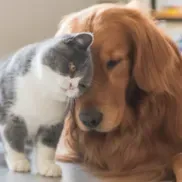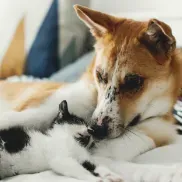Cats make all kinds of sounds. But do you know what they mean? Gain insight into your cat’s behavior so you can get to know these smart, furry companions even better.
Meow
Generally speaking, cats meow to communicate that they want something, such as attention or food. When they’re kittens, their meows are used to get the attention of their mother. As they become adults, their meows are directed at their humans, and not other cats.
A short, interrogative mew often indicates being lonely or hungry. A longer, more plaintive meow can mean worry, annoyance or dislike. If your cat is meowing like this repeatedly, it could mean your cat is sick or injured, and you might want to take them to the veterinarian.
Purr
A soothing cat purr means your furry friend is comfortable and happy.
Very rarely, a cat may “worry purr” if they’re anxious about something. An easy way to tell this purr apart from a happy purr is their body language: their ears are flattened and their body appears tense.
Chirps and chatter
When a cat makes an open-mouth clicking sound that mimics a bird or rodent — chirps and chatter — it usually means they’ve spotted prey they can’t catch. They are simultaneously communicating excitement and frustration.
Trill
A trill is a meow-like sound made with a closed mouth. Cats most often use it as a form of acknowledgment or greeting. You might also hear a cat trill after you do something they appreciate, like giving them a treat.
Hiss
A hiss is a sure sign your cat is not happy. If a cat is showing an open mouth and bare teeth, it’s feeling threatened and is sending a warning to back off. This is true for both humans and other animals.
A cat’s hiss may also be accompanied by an arched back, puffed hair, flattened ears and a twitchy tail.
Snarls and growls
Usually accompanied with a hiss, snarls and growls — which are high-pitched — also indicate the cat wants you or another animal to back off.
Yowl
If a cat’s meow is long and drawn out, it’s known as a yowl, and it’s often a sign of distress. Usually, it’s in cat-to-cat situations. It could be relating to worry, discomfort, territory or mating issues. They may also yowl if they aren’t feeling well. If your cat is yowling consistently — and there aren’t other cats around — you should consider taking it to the vet to rule out illness.











